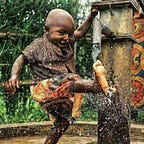First Woman — An interesting coming of age tale that ultimately falls flat
“I fight with the boys . . . I hate chores, I hate kneeling, and I cannot stand babies.” Jennifer Makumbi introduces us to young Kirabo, who bucks against the Lugandan traditions on what it means to be a Ugandan woman. Kirabo wants to be traditional but cannot stop herself from agitating against how it requires her to adjust her behaviour. First woman, with its interesting protagonist, offers up a rich and glowing account of Uganda, her way of life, practices, and interesting nuances of what growing up there looks like. She showcases her astounding descriptive skills in this book; however, the sheer number of stories leave the book dry and sometimes rather dull.
We start with Kirabo as she grows up with her grandparents — her father is sparsely in the picture and she has an unavailable mother — as she seeks counsel from the village witch about her rather peculiar behaviour. The story develops into multiple threads. We follow Kirabo as she schools in the city, develops a romantic relationship with its inherent challenges, finds a deeper understanding of herself, handles a tragedy, and understands the fraught history of her grandparents and the village witch along the way. If that seems like a lot, well it is. Due to the bulk of the story Jennifer Makumbi wants to tell, her 433-page book seems to rush over itself as it races to a conclusion.
Across the book, there are multiple themes that First Woman alludes to: a space for female rights, promoting the beauty of the Lugandan culture with nuances to its overall limitations in its treatment of women, and navigating the hurdles of growing up. In Kirabo’s coming of age story, we grow up with her as she battles lifes challenges and deals with romance. We are introduced to ‘mwenkanonkano’ (Luganda’s term for feminism) through her eyes and see how it helps her make sense of the little parts of herself that stick out. We experience the beauty of Uganda, her tribes, their way of life and their failings. Very few writers can bring out this much colour in a single book but therein seems to lie Jennifer Makumbi’s skillset as referenced in her books Kintu and Manchester Happened.
First woman is a reader’s delight with its descriptiveness and the nuances referenced about Uganda’s culture. However, the plot of the book, despite a likeable protagonist and supporting characters, feels like a buildup that eventually leads nowhere. The heft of the story being told makes it feel glossed over and hasty. We are introduced to a fighty young girl with a determination to make a name for herself and as the book ends, we are left with a girl trying to find an impasse between her boyfriend and his pregnant mistress. The plot flings the readers from one story arch to another without any clarity or depth on what the importance of any of the story arches are.
Makumbi’s book, despite its flaws and limited depth, showcases a vivid view of the lives of Ugandans situated in the era. Despite being countries away, there are good and bad parallels that can be drawn from the East African culture. Our antiquated ways of relegating women to the background needs to be left in the past. It’s clearer that men and women need each other[1], despite this, we can be all too guilty of repeating tropes from the past. It is also key to note that there is a beauty in First Woman, which is the kinship of reading about people who often sound and look like us that’s underrepresented in the Western Media.
First Woman shows significant colour and heavy undertones in a style quite familiar with Jennifer Makumbi. However, the volume of story being told leads to a somewhat clunky book that builds up anticipation and never seems to deliver at the end, as each thread seems to unravel rapidly. First Woman is an okay read as it provides beautiful messages and vivid descriptions despite a comfortable yet unsatisfying plot.
[1] If for nothing, for reproductive reasons
If you liked this review, find a previously published review of the amazing short story, Lagos Noir.
